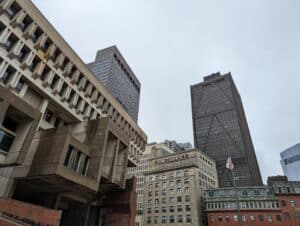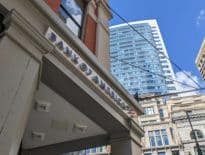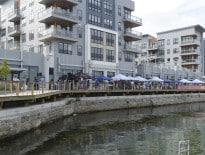
Boston City Hall and downtown Boston office buildings seen from City Hall Plaza. Photo by James Sanna | Banker & Tradesman Staff / file
Owners of downtown Boston office buildings will get a chance to receive tax breaks for residential conversions, provided that the projects meet the city’s affordability and clean energy goals.
Mayor Michelle Wu said the administration is beginning a pilot program for downtown buildings, which is designed to address high office vacancy rates while creating housing and benefiting the downtown economy.
The program will offer qualifying developers a 75-percent reduction in the residential tax rate for up to 29 years, by entering a payment-in-lieu-of-taxes agreement.
“This public private partnership opportunity is the right tool to unlock new housing and shape a new, mixed-use neighborhood Downtown,” Boston Planning & Development Agency Chief of Planning Arthur Jemison said in a statement.
Banker & Tradesman first reported in June that the Wu administration was contemplating public subsidies to encourage conversions.
Property owners have until June 2024 to apply, and will be required to start construction by October 2025, the mayor’s office announced, but projects will be supported by a new ombudsman’s office at the BPDA to help with streamlining the approvals process from other city departments following BPDA board approval. Properties would be subject to a 2 percent fee when they’re sold.
To qualify, developers will have to meet Wu’s proposed new inclusionary development policy, which would increase income-restricted units from 13 to 20 percent, along with the new opt-in stretch energy code, which requires tightly insulated building envelopes and designs to accommodate electric heating systems.
A recent report by the Home Builders & Remodelers Association of Massachusetts estimated the opt-in stretch code will increase multifamily project costs by 2.4 percent.
Additional details will be announced this fall, when applications are made available.
“Boston’s future relies on a vibrant downtown – and it is critical to our housing goals, our climate goals, and our economic future that underutilized office buildings have the tools they need to be reactivated,” NAIOP Massachusetts CEO Tamara Small said in an email. “NAIOP is pleased to see the city recognizes the need for assistance from the public sector to assist with conversions of office buildings to desperately needed housing. We look forward to working with the city as final program parameters are defined to ensure its successful implementation.”
The BPDA already has been studying downtown revitalization strategies through its PLAN: Downtown process, which would rezone portions of the downtown for taller building heights.
Class B office vacancies hit 23 percent in the Financial District and South Station submarket this spring, brokerage Hunneman reported recently, as tenants continue to pull back on leasing activity because of economic headwinds and hybrid work arrangements.
The central business district has approximately 17 million square feet of available office space, according to CBRE data. But architects and real estate executives say many of the buildings are inappropriate for housing, due to structural limitations or high conversion costs without subsidies.
Architects Gensler have analyzed 90 buildings in downtown Boston for their residential conversion potential. Of the 90 buildings analyzed so far, 30 to 40 percent were rated as worthy of further study, with the potential to create up to 5 million square feet of residential space, the firm announced today.








